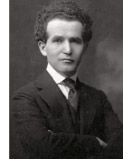On November 29, 1947 (after intensive lobbying, especially in the United States, by Zionist advocates), the United Nations voted to partition Palestine into separate Jewish and Arab States. The Arabs rejected the UN decision outright.
Against the advice of many people, and despite the protests of the United States, as the newly elected First Israeli Prime Minister, Ben-Gurion, declared the establishment of the State of Israel on Friday afternoon, May 14, 1948 at the Tel Aviv museum. The British Mandate expired at midnight that night, and as the British were rapidly departing from the country, armies from the surrounding Arab states attacked Israel.
Ben-Gurion worked with Israeli army commanders to defend the newly established State and repel the Arab armies. At the same time, he oversaw the mass influx of refugees into the country. They were mostly Holocaust survivors languishing in displaced persons camps in Europe, or those who were imprisoned by the British on Cypress when they tried to evade the blockade of Palestine. Other immigrants came from Yemen, Iraq and Morocco, forced out by Arab countries that were uncompromisingly opposed to the establishment of the State of Israel.
Ben-Gurion served as Prime Minister from 1948 until 1953. During this time, he oversaw the establishment of the state’s institutions. He presided over various national projects aimed at the rapid development of the country and its population: Operation Magic Carpet, the airlift of Jews from Arab countries, the construction of the national water carrier system, rural development projects and the establishment of new towns and cities. In particular, he called for pioneering settlement in outlying areas, especially in the Negev.
In late 1953 Ben-Gurion left the government and he moved to Kibbutz Sde Boker in the Negev desert to return to his pioneer agricultural roots and farm the land. It was a difficult task to do because agriculture in the south was still in development and the Israeli economy and infrastructure were still in its infancy.
Because of the problems in government, Ben-Gurion turned his sights back to politics in an effort to help bolster government efficiency. In 1955 he was re-elected to the Knesset, first as the Defense Minister and later as Prime Minister. He served this office until 1963. Afterwards, he resigned his position but remained politically active until 1970 when he officially retired form political life and returned to Kibbutz Sde Boker.
David Ben-Gurion died on December 1, 1973 at the age of 87.
Ben-Gurion International Airport, near Tel Aviv, and the main university in southern Israel, Ben-Gurion University of the Negev, is named in his memory.
For more information go to the following websites:

- www.jewishvirtuallibrary.org/jsource/biography/ben_gurion.html
- www.jewishmag.com/43mag/bengurion/bengurion.html
- www.business.ualberta.ca/yreshef/zionsm/bengurion.html
Faith and Fate is not responsible for the content of external websites
A young David Ben-Gurion